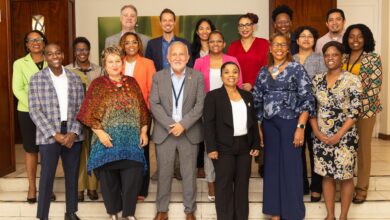WASHINGTON, CMC – The International Monetary Fund (IMF) says economic recovery in the Eastern Caribbean Currency Union (ECCU) is gaining ground, supported by continued low oil prices, strong tourism arrivals, and robust citizenship-by-investment receipts.
The IMF said that three failed banks have been resolved with no spillovers to the rest of the region and fiscal management has improved.

The ECCU includes Antigua and Barbuda, Dominica, Grenada, Saint Lucia, St. Vincent and the Grenadines, St. Kitts-Nevis, Montserrat and Anguilla.
The IMF said that it welcomed the progress in the ECCU in addressing key challenges and the regional economic recovery, and that risks to the near term outlook are balanced, but growth in the ECCU continues to be hindered by weak competitiveness, banking sector fragilities, susceptibility to natural disasters, and large public debt.
Via CMC
In this context, the IMF said it is encouraging the authorities to press ahead with sound macroeconomic policies and structural reforms to decisively address these issues and strengthen the conditions for robust long term growth.
It commended the decisive actions taken to strengthen the resilience of the banking system. In particular, the Washington-based financial institution welcomed the passing of key banking legislation, and the successful resolution of three insolvent banks.
“With non-performing loans still elevated and credit continuing to decline, Directors stressed the importance of swift action to help banks clean up their balance sheets and resume lending. Specifically, they recommended quickly operationalising the regional asset management company and moving ahead with regional foreclosure legislation,” the IMF added.
It said that while the directors generally supported eliminating the minimum saving deposit rate, a few stressed the importance of accompanying this reform with measures to enhance the financial safety net and to avoid discouraging saving and reducing financial inclusion.
They encouraged the authorities to promote consolidation within the regional indigenous banking system to strengthen its long run viability and help lower the risk of further withdrawal of correspondent banking relationships (CBRs) from the region.
They agreed that efforts to strengthen frameworks for international tax cooperation and for anti-money laundering and combating the financing of terrorism should be complemented by continued engagement with international partners in order to mitigate the risk of further loss of CBRs.
The IMF said that it will continue to support further work in this area to assist its members, and encouraged increased global cooperation to address this issue.
The IMF said that it also welcomed the improvements in fiscal discipline, and emphasised that stronger action is needed to achieve the regional debt target of 60 per cent of gross domestic product (GDP) by 2030.
In particular, the financial institution is recommending formulating detailed medium term fiscal adjustment plans and underpinning them with fiscal rules as well as continued enhancements to public finance management frameworks.





